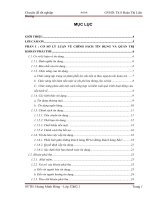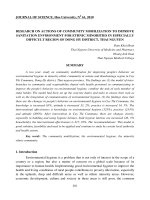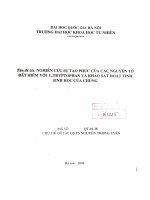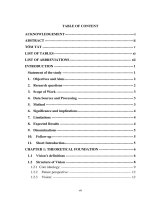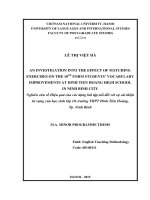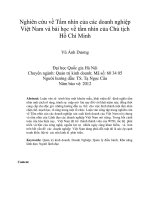KINH TẾ HỌC VI MÔ - Chương 1
Bạn đang xem bản rút gọn của tài liệu. Xem và tải ngay bản đầy đủ của tài liệu tại đây (1.83 MB, 34 trang )
1
1
KINH TẾ HỌC VI MÔ I
MICROECONOMICS
THS. PHAN THẾ CÔNG
2
TÀI LIỆU THAM KHẢO
1. Bộ Giáo dục và Đào tạo. (2005). Kinh tế học vi mô. (tái bản lần thứ
6). Hà Nội: Nhà xuất bản Giáo dục.
2. V
ũ Thị Minh Phương (2006). Bài tập Kinh tế vi mô. Hà Nội: Nhà xuất
b
ản Thống kê.
3. Frank, R.H. (2003).
Microeconomics and Behavior. New York:
McGraw-Hill.
4. Perloff, J.M. (2004).
Microeconomic. (Ed.). Pearson Education Inc.
5. Ph
ạm Văn Minh. (2005). Bài tập Kinh tế vi mô. Hà Nội: Nhà xuất
b
ản Lao động-Xã hội.
6. Pindyck, R.S. & Rubinfeld, D.L. (1999).
Kinh tế học vi mô. (Đại học
Kinh t
ế Quốc dân dịch). Nhà xuất bản Thống kê.
7. Ragan, J.F. & Thomas, L.B. (1993).
Principles of Microeconomics.
(Ed.). Florida: Harcourt Brace Jovanovic.
8. Walstad, W.B. & Bingham, R.C. (1999).
Study Guide to Accompany
McConnel and Brue Microeconomics.
(Ed.) New York: McGraw-Hill.
THS. PHAN THẾ CÔNG
2
3
• /> THS. PHAN THẾ CÔNG
4
CHƯƠNG 1
KHÁI QUÁT VỀ
KINH TẾ HỌC
CHƯƠNG I
THS. PHAN THẾ CÔNG
3
5
NỘI DUNG CỦA CHƯƠNG I
• Đối tượng, nội dung và phương pháp nghiên cứu
Kinh t
ế học vi mô.
• Doanh nghi
ệp và những vấn đề kinh tế cơ bản
c
ủa doanh nghiệp.
• S
ự lựa chọn kinh tế tối ưu của doanh nghiệp
• Tá
c động của một số quy luật đến việc lựa chọn
kinh t
ế tối ưu.
•
Ảnh hưởng của mô hình kinh tế đến việc lựa
ch
ọn các vấn đề kinh tế cơ bản của doanh
nghi
ệp.
CHƯƠNG I
THS. PHAN THẾ CÔNG
6
KHÁI NIỆM KINH TẾ VI MÔ
• Kinh tế học vi mô là một bộ phận của kinh
t
ế học chuyên nghiên cứu và phân tích
các hành vi c
ủa các tác nhân trong nền
kinh t
ế, bao gồm: người tiêu dùng, doanh
nghi
ệp và chính phủ.
• Kinh t
ế học vi mô là khoa học về sự lựa
ch
ọn kinh tế tối ưu trong điều kiện nguồn
l
ực khan hiếm.
CHƯƠNG I
THS. PHAN THẾ CÔNG
4
7
• Sự lựa chọn của người tiêu dùng chính là
t
ối đa hóa lợi ích.
THS. PHAN THẾ CÔNG
8
Q
P
Personal Cons
Expenditure
$
Goods
and Services
Households
(Individuals)
$
i
n
c
o
m
e
$ Expense
Roles:
A.
Resource
owners
B. Consumers
Business
Firms
Role:
Producers
hire resource
Resource offered
S
D
Resource hired
Price
Resource
Resource Market
(Mouse Click to advance)(Mouse Click to advance)
N
P
(Mouse Click to advance)
(Mouse Click to Advance)
Circular Flow
(Mouse Click to advance)
S
(Mouse Click to advance)
D
Goods and
services
(Mouse Click to advance)
Revenue
$
(Mouse Click to advance)
Mouse click for next slide
© L Reynolds, 1999
Q
P
Goods Market
5
9
Gov’t
Purchases
& transfers
Gov’t
Purchases
& transfers
TaxesTaxes
Personal Cons
Expenditure
$
Goods
and Services
Households
(Individuals)
$
i
n
c
o
m
e
$ Expense
Roles:
A.
Resource
owners
B. Consumers
Business
Firms
Role:
Producers
hire resource
Resource offered
S
D
Resource hired
Price
Resource
N
P
(Mouse Click to Advance)
Circular Flow
S
Q
P
D
Goods and
services
Revenue
$
© L Reynolds, 1999
Government
(Mouse Click to Advance)
(Mouse Click to Advance)
Finis
Mouse click to end show, use back
button on browser to return to web
Q
P
10
KHÁI NIỆM KINH TẾ VĨ MÔ
• Kinh tế học vĩ mô là một bộ phận của kinh
t
ế học chuyên nghiên cứu các vấn đề kinh
t
ế tổng hợp của cả nền kinh tế như: tăng
trưở
ng, lạm phát, thất nghiệp, các chính
sách v
ĩ mô,…
CHƯƠNG I
THS. PHAN THẾ CÔNG
6
11
Kinh tế học thực chứng
• Liên quan đến cách lý giải khoa học, các
v
ấn đề mang tính nhân quả và thường liên
quan đến các câu hỏi đó là gì? Tại sao lại
như vậy? Điều gì sẽ xảy ra?,…
• Ví d
ụ: Nhà nước quy định phải đội mũ bảo
hi
ểm khi ngồi trên xe có động cơ trên địa
bàn TP Hà N
ội, lại gây ra nhiều bất lợi cho
người sử dụng nó.
CHƯƠNG I
THS. PHAN THẾ CÔNG
12
Kinh tế học chuẩn tắc
• Liên quan đến việc đánh giá chủ
quan của các cá nhân.
• Ví d
ụ: cần phải cho sinh viên thuê
nhà v
ới giá rẻ,…
CHƯƠNG I
THS. PHAN THẾ CÔNG
7
13
Đối tượng và nội dung nghiên cứu
• Cung và cầu về hàng hóa và dịch vụ.
• Giá c
ả thị trường.
• S
ự can thiệp của chính phủ vào nền kinh
t
ế thị trường.
• Hành vi l
ựa chọn của người tiêu dùng.
• Hành vi l
ựa chọn của nhà sản xuất.
• C
ạnh tranh, độc quyền, doanh thu, lợi
nhu
ận,…
CHƯƠNG I
THS. PHAN THẾ CÔNG
14
1
Ten Principles of Economics
THS. PHAN THẾ CÔNG
8
Economy. . .
. . . The word economy comes from a
Greek word for “one who manages a
household.”
THS. PHAN THẾ CÔNG
Nguồn: G. Mankiw (2003)
TEN PRINCIPLES OF
ECONOMICS
• A household and an economy
face many decisions:
– Who will work?
– What goods and how many of them should be
produced?
– What resources should be used in
production?
– At what price should the goods be sold?
THS. PHAN THẾ CÔNG
9
TEN PRINCIPLES OF
ECONOMICS
Society and Scarce Resources:
– The management of society’s resources is
important because resources are scarce.
–
Scarcity. . . means that society has limited
resources and therefore cannot produce all
the goods and services people wish to have.
THS. PHAN THẾ CÔNG
18
TEN PRINCIPLES OF
ECONOMICS
Economics is the study of how society
manages its scarce resources.
THS. PHAN THẾ CÔNG
10
TEN PRINCIPLES OF
ECONOMICS
• How people make decisions.
– People face tradeoffs.
– The cost of something is what you give up to
get it.
– Rational people think at the margin.
– People respond to incentives.
THS. PHAN THẾ CÔNG
TEN PRINCIPLES OF
ECONOMICS
• How people interact with each other.
– Trade can make everyone better off.
– Markets are usually a good way to organize
economic activity.
– Governments can sometimes improve
economic outcomes.
THS. PHAN THẾ CÔNG
11
TEN PRINCIPLES OF
ECONOMICS
• The forces and trends that affect how the
economy as a whole works.
– The standard of living depends on a country’s
production.
– Prices rise when the government prints too
much money.
– Society faces a short-run tradeoff between
inflation and unemployment.
THS. PHAN THẾ CÔNG
Principle #1: People Face Tradeoffs.
“There is no such thing as a free lunch!”
THS. PHAN THẾ CÔNG
12
Making decisions requires trading
off one goal against another.
Principle #1: People Face Tradeoffs.
To get one thing, we usually have to give up
another thing.
– Guns v. butter
– Food v. clothing
– Leisure time v. work
– Efficiency v. equity
THS. PHAN THẾ CÔNG
Principle #1: People Face Tradeoffs
• Efficiency v. Equity
– Efficiency means society gets the most that it
can from its scarce resources.
–
Equity means the benefits of those resources
are distributed fairly among the members of
society.
THS. PHAN THẾ CÔNG
13
Principle #2: The Cost of Something Is
What You Give Up to Get It.
• Decisions require comparing costs and
benefits of alternatives.
– Whether to go to college or to work?
– Whether to study or go out on a date?
– Whether to go to class or sleep in?
• The opportunity cost of an item is what
you give up to obtain that item.
THS. PHAN THẾ CÔNG
Principle #2: The Cost of Something Is
What You Give Up to Get It.
LA Laker basketball
star Kobe Bryant
chose to skip college
and go straight from
high school to the
pros where he has
earned millions of
dollars.
THS. PHAN THẾ CÔNG
